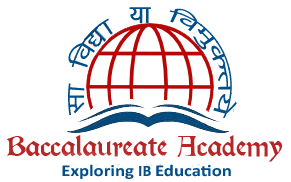For students completing the programme ? in year 5, is a culminating experience in which students apply their approaches to learning skills to complete an extended, self-directed piece of work. This required component provides opportunities for creative and truly personal demonstrations of learning.
Educational program | What is IB Tutions
Baccalaureate Academy offers IB Tuitions

- The International Baccalaureate (IB) offers high-quality programmes of international education to a worldwide community of schools.
- There are more than 890,000 IB students at 3,108 schools in 140 countries.
- The IB programme is more practical, having a broader spectrum of subjects that lead to all-round development.
- The focus is on ‘how to learn’ rather than ‘what to learn’.
Baccalaureate Academy is a real gem for families inhabiting the world of the IB.

Advantages of IB
- Requires breadth and depth of study, helping students to adopt different learning methods.
- Opportunities to study topics of varied interest
- Assessment process facilitates continuous learning
- Encourages students to participate in extra-curricular activities
- Prepares students well for tertiary study
IB Maths HL/SL
IB Maths
Because individual students have different needs, interests and abilities, four courses in mathematics are available:
Mathematical Standard Level, Mathematics Higher Level
IB (International Baccalaureate) and IGCSE (International General Certificate of Secondary Education).
IB
What Parents, Students, and Teachers Say
Their own abilities in mathematics and the type of mathematics in which they can be successful
- Their own abilities in mathematics and the type of mathematics in which they can be successful
- Their own interest in mathematics, and those particular areas of the subject that may hold the most interest for them
- Their other choices of subjects within the framework of the Diploma Program
- Their academic plans, in particular, the subjects they wish to study in future
- Their choice of career
IB Physics
WHY STUDY PHYSICS?
FEATURES OF OUR IB PHYSICS TUITION PROGRAM
Physics are crucial years in building the interest and foundation of students in preparation for H2 physics. Through this period, students are required to investigate natural phenomena, understand the principles, theories and laws to explain the physical behaviour of the universe and finally apply patterns and models (including mathematical ones) to new situations. At the IB level, students find that they are taught a greater breadth and depth of the content and are often faced with mathematically demanding questions that challenge them beyond the O level syllabus. This is advantageous as it gives the students earlier exposure to A-level content, but on the other hand, it can be counterproductive when students have less time to fully appreciate the physics behind the mathematics or when students find that they are not taught the skills to handle the unorthodox questions set by the schools. This leads to the student not liking the subject, which consequently leads to poorer performance. At Baccalaureate Academy, our approach is to help our students first comprehend and appreciate the concepts. This is in part achieved through our specially developed notes that not only highlights the key concepts, but also take various tangents to discuss the application of physics to real-world scenarios and other disciplines. In addition, our teachers are well trained and have the passion and dedication to bring the subject alive and encourage curiosity. Once comprehension is achieved, computation will be with understanding rather than just an exercise of plugging numbers into formulae that seems to fit. In addition, our teachers have years of experience teaching the subject which will allow them to know exactly where the common misconceptions and errors are. They will also impart to the students question answering techniques that will help them gain confidence in school examinations. By the end of the two years, while our primary concern is to help our students perform to the best of their ability in the examinations, our program also aims to develop in our student’s a keen interest and a greater appreciation of the natural phenomenon, as well as various technologies in their day to day encounters. The analytical skills that they have learnt will also benefit them tremendously in future, whether or not they decide to pursue physics at the A levels.
